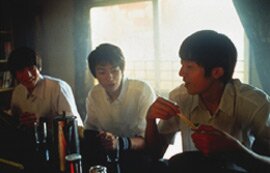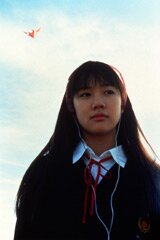![]()
THE PERILS OF TEENAGE LIFE IN JAPAN
Shunji Iwai's All about Lily Chou Chou
reviewed by Mark Schilling
The observation that teenagers live on another planet is not new, but in Japan today, that planet seems more like the asteroid belttumbling rocks of teen culture that are not only harder to reach, but also inhabited by ever-smaller communities. Those communities still gather at places like Harajuku, a Tokyo youth hang-out zone where goths in black leather warily eye girls dressed like Little Bo Peep; but more and more are meeting like minds in cyberspace, particularly in the chat rooms and message boards that attract everyone from death-metal fans to hamster lovers.
Among the more knowledgeable and sympathetic adventurers in these realms is Shunji Iwai, the director of Love Letter (1995), Swallowtail (Swallowtail Butterfly, 1996), and Shigatsu Monogatari (April Story, 1998). Trained in the craft of the music video and TV commercial, Iwai has a sophisticated grasp of the digital tools that filmmakers use today to create and
|
manipulate images. He and cinematographer Noboru Shinoda are joint authors of a cinematic style that is coolly detached on its surface but romantic at its core, that finds truth more in glancing impressions than in sustained observation, that would rather lose itself in deliquescent (or disturbing) visions than thread its way through labyrinths of plot. Watching his first feature, Love Letter, in 1995 with a mostly young female audience, I felt that I was not just at another screening but at an event. The buzz in the packed theater was similar to that of a popular club, with Iwai's film as the headline act. The film, about |
 |
|
Hayato Ichihara as Hasumi (left) and Shugo Oshinari as Hoshino (center), with a school friend in All about Lily Chou Chou
(Cowboy Pictures) |
Though he will turn forty in January, Iwai is still essentially that filmmaker in his outlook and concerns, like a hero in a shojo manga (girls comic) who is condemned to never age or change. This is smart marketingthe Japanese cinema audience is a young onebut in Iwai's case, there is something more. Unlike the many middle-aged Japanese filmmakers who take an anthropological or nostalgic view of youth, he is as media savvy and trend conscious as the audience is, and always has been: he's the cool older brother to Japan's Generation Y.
 |
Iwai's style and sensibility are well suited to his latest film, All About Lily Chou Chou. The hero, Yuichi (Hayato Ichihara), is a second-year junior high school student in an idyllic countryside setting whose life revolves about Lily Chou Chou, a pop singer with a throaty delivery, druggy sound, and mysterious charisma. Running with his classmates, he indulges in typical teenage crime, such as shoplifting CDs and selling the rejects to used-record shops. Yuichi, as it turns out, is a wimp and a tool who survives the perils of teenage life by attaching himself to the stronger, more controlling students and sullenly doing their bidding. Then, when he cannot stand it anymore, he retreats to his private world of CD sounds and Internet chat, where he is free to express his true feelings to people he has never met, particularly to a girl who goes by the handle "blue cat." Flash back to 1999, when |
|
Yu Aoi as Tsuda in All about Lily Chou Chou
(Cowboy Pictures) |
Then summer comes, and Hoshino, Yuichi, and other kendo club members go to Okinawa on money they rip off from a gang of punks (who, in turn, ripped it off from a man in a parking lot). There they meet pretty girls and friendly natives, and have the time of their young lives. The good vibes turn bad, however, when a hippie acquaintance nearly loses his life in a road accident and Hoshino nearly drowns. It is almost as though the island gods have cursed them. When the new semester begins, Hoshino returns with a new, dark personality, beating and bullying with a casual cruelty. He makes Yuichi his slaveand Yuichi's life becomes a living hell.
Hoshino and his henchmen expand their criminal activity beyond petty larceny, forcing a classmate, Tsuda (Yu Aoi), into prostitution, with Yuichi serving as go-between. Meanwhile, a clique of punk girls take a dislike to Kuno and, with Yuichi's help, torture her with fiendish ingenuity. Parents and teachers? Totally clueless. Meanwhile, Yuichi pours out his love for Lily Chou Chou nightly on the Internet, while in the daytime he retires to a nearby rice field to listen to her musicand wrestle with what remains of his soul. When, we wonder, is the worm going to turn?
While we are waiting, the lushness of the imagery (all those gorgeous shots of blue skies and waving rice) and the beauty of the music (Debussy's Arabesque providing accompaniment to the torments of the damned) begins to feel distanced and smug. Also, in its 146-minute running time, All About Lily Chou Chou lives up to its title all too literally, achieving a perfect unity of the director's self-indulgence and the hero's self-involvement. Nonetheless, Iwai's depiction of the teenage-world-as-jungleeat or be eatenhas a persuasive authority, as though he has not observed these kids so much as gotten inside their heads. By the end of the film we understand why Yuichi cannot live without Lily: in a world gone wrong, she is the only one who will never betray him.
Mark Schilling, a resident of Tokyo since 1975, reviews Japanese films for The Japan Times and the Japanese edition of Premiere. He has also written The Encyclopedia of Japanese Pop Culture and Contemporary Japanese Film, both published by Weatherhill.